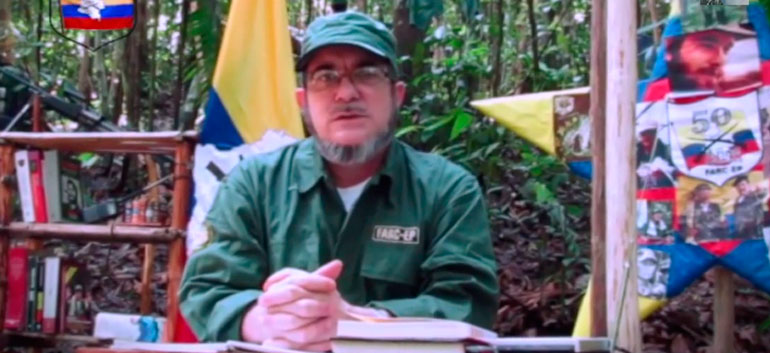The FARC has marked its 50 year anniversary with a video message that criticizes both President Juan Manuel Santos as well as the “military oligarchy.”
A video released by the country’s largest rebel group on Monday features top FARC commander “Timoshenko” stating,“We know well that the only thing that the elite classes are expecting of us is a humble surrender […] but at the negotiating table our aspirations are completely different.”
“We are in Havana because we dream of a real peace,” Timoshenko added.
The rebel commander goes on to criticize Colombian President Juan Manuel Santos for allegedly using peace as a campaign platform while continuing his military offensive against the rebel group.
The FARC has been fighting the Colombian state since its formation in 1964 in what has become the oldest internal armed conflict in the world. It has been involved in ongoing peace negotiations with the Colombian government since November 2012.
Tuesday marks the groups 50-year anniversary.
MORE: Colombia vice president calls on rebels to uphold and extend unilateral ceasefire
A bulk of the commander’s criticism focuses on the Colombian government, whom Timoshenko accuses of using peace as a political tool while continuing its military actions against the rebels.
“President Santos accused the opposition fanatics of the extreme right of wanting to kill the hope of the Colombian people, as if he were not intensifying his military campaign and bombardment against the rebel leaders involved in the Havana peace talks,” Timoshenko stated.
Santos’ talks of peace, according to the rebel commander, also “ridicules” Colombian farmers who have been protesting to “stop and reverse the effects of neoliberal policies.”
“We are not in Havana because we consider ourselves defeated,” Timoshenko stated, “we are there because nothing is certain in the class struggle and conflicting interests in our country.”
The rebel commander’s comments are significant because they mark the first public statement made by the FARC since the first round of presidential elections took place on Sunday.
A central part of the Santos campaign focused on his administration’s success with the negotiations, which have been a large source of controversy in Colombian society and politics.
MORE: Zuluaga make suspending FARC peace talks central point in race to 2nd round
The victor in Sunday’s elections, hardliner Oscar Ivan Zuluaga, has announced that he would cease the peace talks if he is voted president in the election’s second round on June 15.
In a press conference following a tense but peaceful electoral contest, Zuluaga reiterated an earlier promise to suspend the talks, stressing he would do so on his first day in office.
The bilateral ceasefire proposal submitted repeatedly by the FARC but rejected by the Santos government is also not negotiable, said Zuluaga.
“In no way can we talk about a bilateral ceasefire. There must be a unilateral ceasefire because it is they who are attacking Colombians,” the candidate added.
MORE: Rebel groups enact ceasefire ahead of Colombia presidential elections
On Monday, Colombia’s Vice President called on the FARC to indefinitely extend a ceasefire enacted by the rebel group during the country’s elections.
“Hopefully the guerrilla fighters of the FARC and the ELN decide to declare an indefinitely ceasefire on May 28. The guerrillas should commit themselves, on behalf of the population, to cease kidnapping, and set free those who are in captivity,” Vice President Angelino Garzon was quoted as saying.
The FARC has been involved in ongoing peace negotiations with the Colombian government in Havana, Cuba since November 2012.
MORE: FARC agrees to end all illicit drug operations at Colombia peace talks
The two sides recently reached an agreement on the topic of drug cultivation and trafficking, the third of six agenda items for the talks.
The next round of talks will move on to the subject of victims of Colombia’s longstanding armed conflict, expected to be one of the more complicated and emotionally charged points on the agenda. An estimated six-million Colombians are direct victims of the fighting between rebels, the country’s military and state-aligned paramilitary groups.
Three previous attempts at peace talks between the government and rebels failed, but the Cuba talks have gone uninterrupted since their inception, despite continued hostilities between rebel and public security forces in Colombia.


